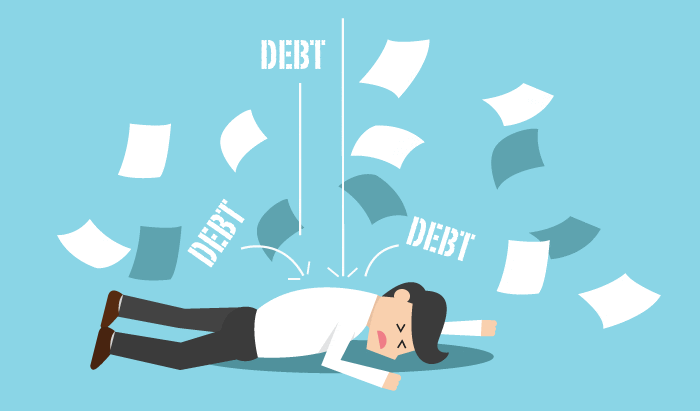There’s plenty of guidance on managing numbers—budgets, balances, interest rates. What’s often missing is help for the emotional impact of debt. If you’re falling behind on payments and feeling overwhelmed, you’re not alone—and you’re not “bad with money.” Debt is designed to be seductive and stressful. Understanding the psychology behind it is the first step to taking control. (If you want a primer on why debt hooks us in the first place, see the psychology of debt.)
The Vicious Cycle of Debt (and Why It Feels So Heavy)
- You miss or default on a payment.
- Shame and guilt kick in.
- You go into denial—stop opening letters, ignore emails and calls.
- The problem grows in your imagination.
- Anxiety and hopelessness build; it feels like a black cloud follows you.
- Denial deepens; the unopened mail pile grows.
- More defaults happen—and the cycle repeats.
Debt collectors know this cycle well. Before a professional adviser gets involved (which often reduces what creditors can demand), some will push hard to extract quick payments. When you’re scared, it’s easy to agree to amounts you can’t afford. The key lever in this loop is denial. Break denial and you break the cycle.
Break the Cycle: Practical, Compassionate Steps
- Open everything. Set a 20–30 minute timer and sort all correspondence into two piles: “urgent” (court claims, default notices) and “other.” Just sorting is a win.
- Get a full picture. Create a simple list: creditor, balance, interest rate, minimum payment, and status. Seeing the whole map reduces dread.
- Stop promising what you can’t pay. If a collector calls, say, “I’m preparing a budget and will respond in writing.” You’re allowed to pause and plan.
- Build a realistic budget. Prioritise essentials (food, housing, utilities, basic transport). Everything else comes after. If stress spikes while you plan, try this brief reset: a 3–5 minute breath practice from this simple meditation technique.
- Shift from calls to letters/emails. Written communication gives you a record and time to think. Ask creditors to freeze interest/charges while you assess options.
- Get free, impartial advice. Contact Citizens Advice for step-by-step support, template letters, and rights information. Professional guidance often leads to more manageable arrangements.
- Protect your mental health. Debt distress is real. Gentle movement can lower anxiety and improve problem-solving; try ideas from exercise to help with low mood or a short daily walk.
What “Taking Control” Looks Like
Once you hand your plan—and preferably your creditor communications—over to a reputable adviser, something shifts. Harassing calls should reduce, affordable repayment offers replace panic promises, and you reclaim headspace. This is often the true beginning of recovery: you’re back in charge.
Common Worries, Reframed
- “My credit score will be ruined.” If you’ve already defaulted, the damage is mostly done. Getting advice now won’t make it worse—and can prevent costlier outcomes.
- “I should handle this alone.” Debt thrives in secrecy. Support is a strength, not a failure.
- “I have to pay everyone everything immediately.” Essentials first; creditors next. Fair, affordable offers are legitimate and often accepted.
Final Word
Open the envelope. Ask for help. Make one small, kind decision today that your future self will thank you for. If you’re curious about the beliefs that pull us into borrowing in the first place (like future discounting and identity-driven spending), revisit the psychology of debt—and pair your mindset work with daily nervous-system resets using simple meditation and mood-lifting movement from exercise for depression. You don’t have to do this perfectly—you just have to begin.


